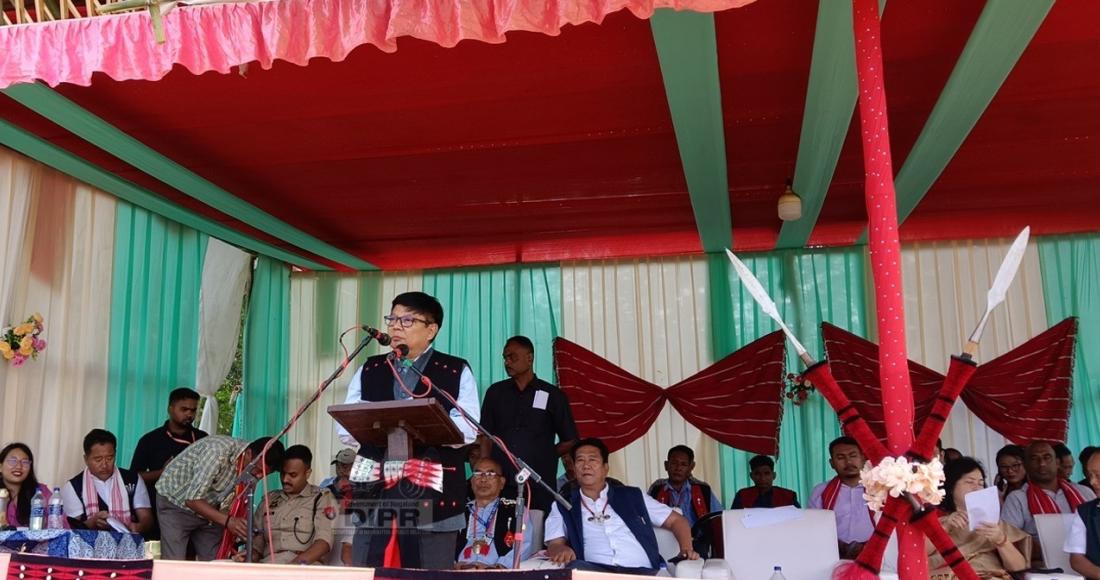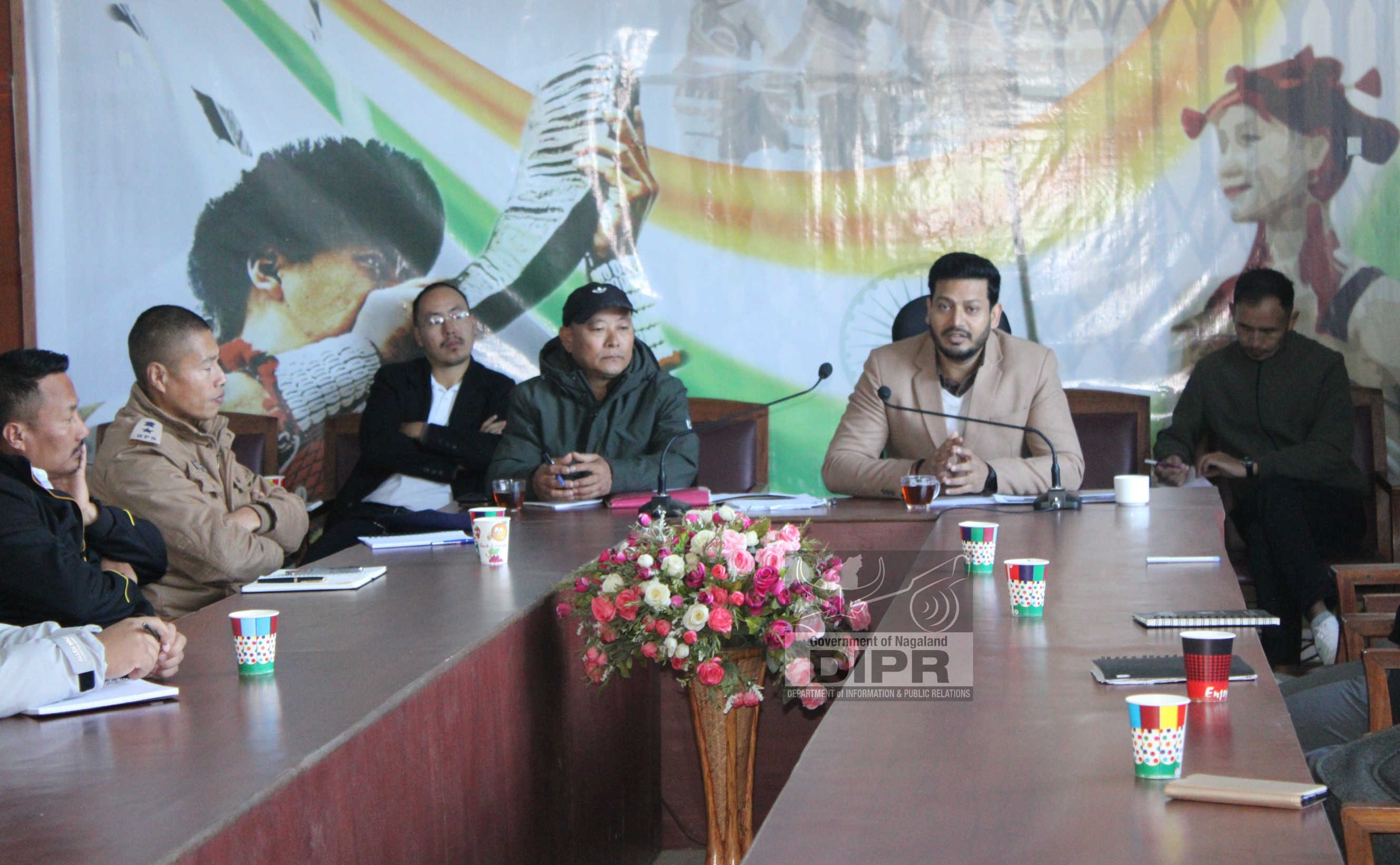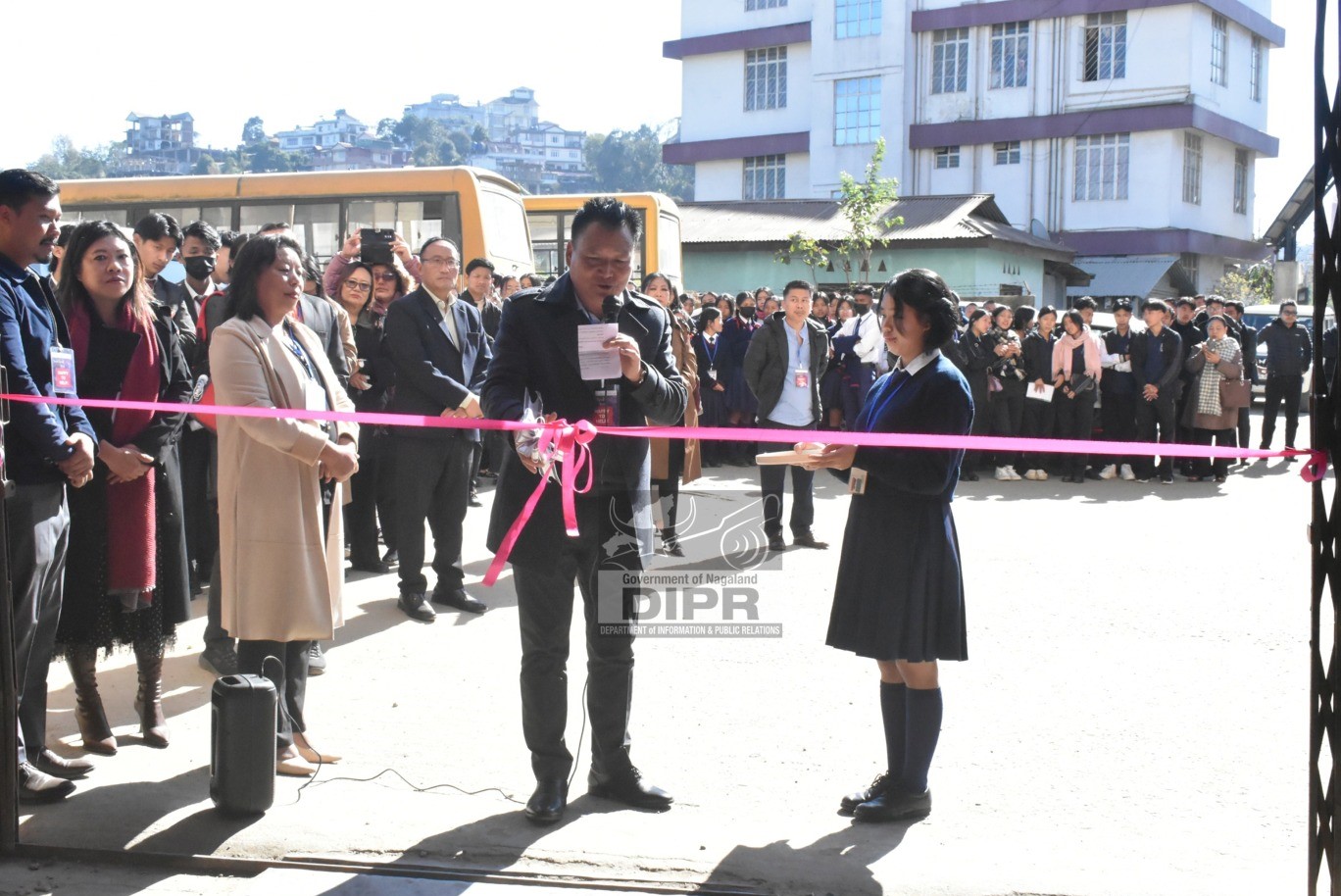The Phom community bordering with Sivasagar district of Assam held a cultural exchange programme on 16th May 2025, at public ground Yonglok, under Tamlu sub-division of Longleng District. MLA and Leader of Opposition Government of Assam, Debabrata Saikia, graced the occasion as the special guest, While MLA A. Pongshi Phom graced the occasion as guest of honour, and MLA, B. Bangtick Phom was the chief host. The programme commence with an invocation pronounced by Pastor Longleng Town Baptist Church Rev. H. Beau Phom.
Debabrata Saikia, in his address said, since 1962, the 6th of June has been celebrated as Phom Day, a day dedicated to peace and harmony in their land. As this special day approaches, he extended his warm congratulations to the Phom community, who are strong believers in Christianity and do not worship any idols. They refer to their supreme God as Kahvang, a word derived from Kah (Heaven) and Vang (Earth), and believe that their Shang Kahvang is the controller of everything.
On the occasion he asserted that, he is very happy to see that the traditions and cultures passed down by their ancestors are still being preserved and practiced today. Historically he said the Ahoms and the Nagas have shared a deep friendship. When Assam was going through turmoil under an autocratic ruler, the king came to Nagaland and married the daughter of the Wangshu king. In Assam, she is known as Dalimi, he added.
We all belong to India and are proud citizens of a democratic country. But at the same time, we should never forget our own cultures and traditions, and must always respect and uphold them, he said.
He also called upon the people of both the community of Assam and Nagland to support each other in time of difficulty, and asserted that our work and efforts should benefit both Assam and Nagaland. Saikia also said that though we each have our own laws, we must not take the law into our own hands. Instead, we should allow the administration to resolve any misunderstandings that may arise.
While encouraging everyone to take advantage of the various government schemes available, Saikia said although we may come from different political parties, we must work together for the betterment of our society, unite for development and share our challenges. In doing so, we can bring prosperity to our states.
Lastly Saikia said, this cultural exchange program will promote greater unity and contribute to lasting peace and prosperity in the region. Therefore, he urged both the community to continue to preserve the rich cultures and traditions, and move forward as a united team, to ensure peace, prosperity, and progress. This is possible only through cooperation from all sides, he added.
MLA, B. Bangtick Phom said, with great pride and humility, we stand together today, not merely as a representative of the Nagas and Phoms, but as a voice carrying forward the centuries-old bond between our lands a bond forged through shared struggles, collaboration, and mutual respect.
He said when the Ahoms first entered Assam in the 13th century, crossing the Patkai Hills under the leadership of Sukaphaa, they did not march into emptiness. They entered into a world of thriving hill societies among them, the Namsangia guardians of these ridges and rivers.
Our oral traditions speak of war and friendship, of treaties and kinships. When the Ahoms expanded eastward under Suhungmung in the 16th century, it was not through annihilation, but through negotiation as seen in the 1536 treaty that respected the boundaries and dignity of the Namsang people. In return, we shared knowledge, faith, and protection, he said.
In the later centuries, as Ahom influence deepened, cultural exchanges flourished. The Phoms who lived along these passes did not merely observe the Ahoms, we engaged with them. We hosted them. But it is perhaps the 19th century, the years of fire and displacement (1817–1826) brought our people closest.
When the Burmese armies invaded Assam, toppling Ahom kings and burning villages, many Ahoms fled and they fled not westward, but eastward, seeking shelter in the hills in Bura Namsang, among the Phom and Namsang, they found refuge, Bangtick stated.
And more than that, we fought beside them. Oral accounts from our elders recall how the Burmese commander, Mansingpho, was slain on these lands, perhaps even with a blade still preserved among our people. In gratitude, the Ahoms gifted idols to our forebears’ as signs of brotherhood forged in struggle.
And when the time came for the Ahoms to return to their homeland, each refugee carried a stone from Namsang, a token of gratitude. Today in Assam it is said there lays a heap of stones at Mikhipur Assam, a silent monument to Namsang’s shelter and sacrifice.
Bangtick appealed the gathering not to forget this shared legacy, not merely of culture, but of conscience. “While we celebrate our shared legacy, we must also acknowledge present-day concerns. There are growing anxieties among our people about land boundaries disputes in the Namsang region. These are not just disputes over terrain, but reflections of a deeper need for dialogue, clarity, and respect. Let this occasion mark not just cultural unity, but also a commitment to resolve such matters in a spirit of trust and fairness, just as our ancestors did in the past.”
He said we are all aware that land is not just a resource, but a part of our identity, a sacred link to our ancestors. However, let us not let this divide us. But work together, as communities who have stood side by side in history, to address these issues with mutual respect and understanding. He urged upon everyone to continue what we started, and suggested that this kind of program to be held every year or once in two years.
He also advised to resolve every difference with wisdom, and focus on what we can accomplish together, not just in culture, but in prosperity, education, infrastructure, and community development.
MLA, A. Pongshi Phom said, Assam has a rich and vibrant culture which has an undeniably far reaching influences and impact among the people of its neighbouring states. He was optimistic that organizing of such programme would definitely navigate cultural differences and helps in communicating with diverse background, develop cross-cultural communication skill, and introduce us to new culture, language, foster deep appreciation for diversity and most importantly encourage sense of global citizenship and promote understanding and tolerance across varying cultures.
When we talk about relationship between the people of Assam and Nagaland, the people of both the states are peace loving and tolerant. The relationship is not restricted to exchange of goods and economic alone but it was more of an exchange of cultural practices which foster mutual relationship and dependences between the communities. Therefore, he urged both the communities to appreciate and respect each other's differences and similarities.
Pongshi also highlighted the India-Myanmar-Thailand Trilateral Highway (IMT Highway) which is under construction will connect Moreh, India with Mae Sot, Thailand via Myanmar, will be a game changer for the region. He said under the leadership of the Chief Minister of Nagaland, Dr. Neiphiu Rio, efforts is being made to construct road from Longleng-Tobu-Noklak to Myanmar to connect with the rest of ASEAN nations. He believe that, those neighbouring places such as Charaideo, Sivasagar, Jorhat etc. with immense scope of having road connectivity with Eastern Nagaland will be greatly benefitted.
Deputy Commissioner Longleng W. Manpai Phom, NCS, and Addl. Deputy Commissioner Sivasagar, Geetalee Dowerah, also delivered solitary massage in the programme. The welcome address was delivered by President Phom Peoples Council, Y.B. Angam Phom, and short speech was also said by the Ex-MLA Assam, Kushal Dowari and Chairman Tai Ahom Development Council Assam, Mayur Burgohain.
The highlights of the day long programme includes cultural dance performed by Tamlu village male (Nagaland), Bura Namsang female (Nagaland), Bamboo dance by Shetep village (Nagaland), Jeng Behu (Assam), Husori Behu (Assam), Kangching Village male (Nagaland) and Pongo cultural troops (Nagaland).
The programme was chaired by ADC Tamlu, T. Lankonsen Tsanglao, and moderated by EAC Hq Longleng, Imkongnukla Ao. The programme concluded with, vote of thanks by the chairman.
(DPRO and Manjong, IA Longleng)




